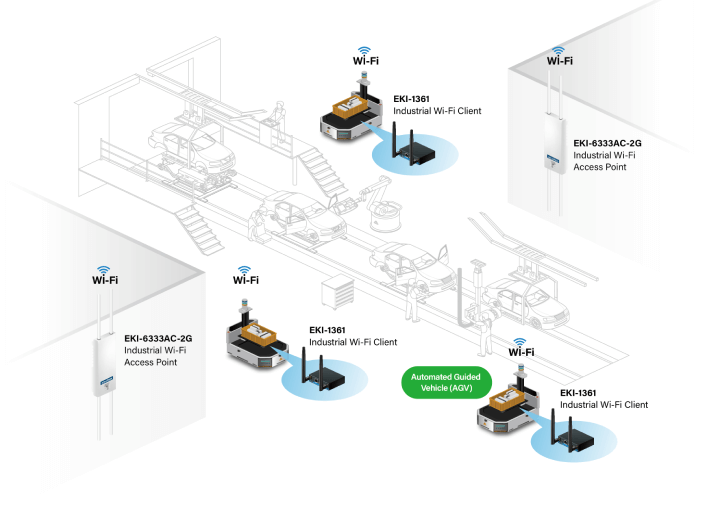RGV in Logistics: Studying Rail-Guided Integration in EVs
Educational | 04-09-2023 | By Advantech
In the realm of smart logistics, the rise of automated transport vehicles has been nothing short of remarkable in the past decade, with major car manufacturers investing in the establishment of entirely new vehicle production lines. In addition to traditional use industries such as machine manufacturing and chemical processing, new applications in electronics and home appliances are increasing the sales of alternative fuel vehicles, particularly electronic vehicles (EVs).
With the rise of Industry 4.0 and the increasing demand for electronic vehicles, automating production lines using advanced technologies like RGVs has become paramount. Advantech, with its rich history in embedded A-IoT solutions, has been at the forefront of this revolution, ensuring efficient and seamless production processes.
Compared to traditional automobile production lines that include important assembly, welding, and painting stages, the crux for EV manufacturing is the power battery technology. Accordingly, optimising the production of power batteries has become the primary focus of EV investment and R&D.
Recently, a vehicle manufacturer located in China launched several EVs that were well received and attracted record sales, solidifying its position as a leader of China’s EV market. Currently, the manufacturer is one of only a few automobile brands that has both vehicle manufacturing technology and patented core lithium battery technology. To maintain their competitive advantage, the manufacturer is keen to upgrade the factory infrastructure and production processes for maximum efficiency and productivity.

System Requirements
Given the criticality of energy storage systems in EVs, the manufacturer's main objective was to streamline the production process to ensure consistently high-quality batteries. There are three main stages involved in EV battery production: electrode manufacturing, cell assembly, and battery pack finishing. In this application case, the manufacturer wanted to upgrade its battery pack production operations while also improving yield and reducing costs.
Rail-guided vehicles (RGVs) are often used in warehouses for rapid, high-capacity processing. Wanting to automate and expedite battery cell handling, the manufacturer planned to upgrade their factory production lines with RGV trolleys. As a railed shuttle, RGVs can be easily integrated with other logistics systems, such as outbound/inbound stations, buffer stations, conveyors, elevators, and robots, for material handling and transport of materials.
Advantech's products, such as the EKI-1361 and EKI-6333AC-2G, have been specifically designed to address these challenges, ensuring robust and reliable communication in demanding industrial environments.
However, the existing infrastructure and high-density layout of production lines, as well as the presence of several steel structures and high-powered electrical devices, generate significant electromagnetic interference. Therefore, to ensure reliable communication between the scheduling system, RGV control system, and handheld tablets, a robust Wi-Fi network with reliable connectivity for industrial-grade data transmissions must be established.
Additionally, because the existing PLC control system uses Modbus, the wireless communication solution must support Modbus protocol forwarding for easy, seamless integration. At the same time, because the factory has multiple production lines, the systems of each production line must be independent of each other to avoid production anomalies.
Project Implementation
- EKI-1361: A single-port RS-232/422/485 device server with 802.11 a/b/g/n WLAN capabilities.
- EKI-6333AC-2G: IEEE 802.11 a/b/g/n/ac Concurrent Dual-Band Wi-Fi AP/Client
- EKI-2528: Industrial Unmanaged Switch
System Description
In this scenario, a comprehensive RGV solution was employed to bring automation to the production line, ensuring adaptability in the manufacturing process. Battery pack production lines were equipped with rails and RGV trolleys for handling materials and transporting battery cells and modules. To provide wireless communication capabilities, Advantech’s EKI-1361 Wi-Fi clients and EKI-6333AC-2G Wi-Fi access points (APs) were leveraged as key components.
Advantech's dedication to pioneering solutions shines through in the flawless amalgamation of its product range. The combination of EKI-1361 and EKI-6333AC-2G ensures that the RGVs operate efficiently, reducing downtime and increasing overall productivity.
EKI-1361 clients offer serial-to-Wifi, Ethernet-to-Wi-Fi, and 2.4G/5G support, increasing the flexibility of solutions and delivering the wireless communication and network connectivity needed for RGV applications. The RGV trolleys feature a PLC control cabinet that was installed with an EKI-1361 client networked to a PLC controller via an Ethernet connection. On each production line, an EKI-6333AC-2G Wi-Fi AP was installed as a wireless override and connected to the scheduling system host via a network cable.
Operators can use handheld tablets to schedule production orders and communicate wirelessly with the PLC on RGVs to execute transport operations and move RGVs to designated stations. RGVs help move materials around the workshop in accordance with the demands of industrial production materials. Once materials and/or products are loaded onto RGVs, automated route scheduling ensures rapid, error-free processing. For intelligent factory operations, the solution delivers the automation and flexibility to realise efficient and cost-effective unmanned production.
Educational Insights
The integration of RGVs in production lines showcases the potential of automation in modern manufacturing. For students and professionals alike, understanding the intricacies of such systems can provide valuable insights into the future of industrial processes. The case also underscores the importance of reliable communication infrastructure, highlighting the role of Wi-Fi connectivity in ensuring seamless operations.
System Diagram

Benefits
The logistics strategy, powered by RGVs, set the cornerstone for refining the production of elite EV batteries. Compared to other equipment commonly used in material transportation, this solution is not restricted by network availability, equipment distribution, or installation space. Instead, the manufacturer was able to establish uninterrupted network connectivity throughout the factory by adopting Advantech’s EKI-1361 and EKI-6333AC-2G Wi-Fi communication devices.
EKI-1361 Wi-Fi clients offer fast roaming capabilities (<100ms gap for connections, background channel sniffing, fast auto channel selection, etc.), while EKI-6333AC-2G wireless APs deliver stable network coverage, overcome electromagnetic interference, and support 2.4G/5G dual-band communication for multi-device access. This ensures seamless communication with automatic AP switching as RGVs move across the Wi-Fi network. Moreover, with the inclusion of two Gigabit Ethernet ports for flexible configuration and network planning, trolley routes can be designed as long as needed without cabling concerns for improved workflows.
Offering excellent compatibility and ease of deployment, the RGV logistics solution not only supports isolated operation but can also be integrated with other production and control management systems to provide a range of functions, including quality inspections, warning reports, and work order management. For high-density production lines or scenarios where human labour is inappropriate, replacing manual handling with RGV trolleys can minimise error rates, deliver high positioning precision, lower labour costs, and complete material handling tasks with accuracy and speed.
In addition to warehousing and materials handling, RGVs offer a wider range of potential applications for solution manufacturers. As technology continues to advance, future solutions may integrate multiple functions into one vehicle to support several applications for maximum efficiency. Through continuous optimisation of product features, Advantech provides customers with reliable wireless communication solutions that can be rapidly deployed and flexibly configured.
From an educational standpoint, this case study serves as a testament to the transformative power of technology in manufacturing. It offers a practical look into how traditional processes can be revamped with modern solutions, providing a learning opportunity for those keen on exploring the intersections of technology, logistics, and production.

